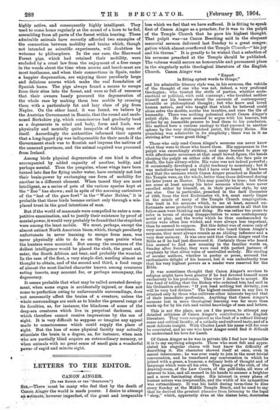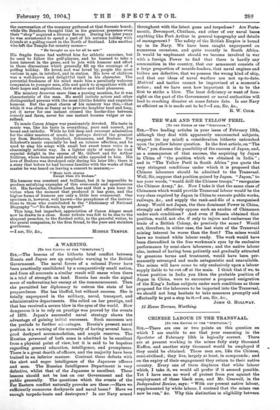CANON AINGER.
[TO THY EDITOR OF TH8 "SPECTATOR:] [TO THY EDITOR OF TH8 "SPECTATOR:]
Sin,—There must be many who feel that by the death of Canon Ainger the world is made poorer. I desire to attempt loss which we feel that we have suffered. It is fitting to speak first of Canon Ainger as a preacher, for it was to the pulpit of the Temple Church that he gave his highest thought. That pulpit was—as Canon Beeching said in the eloquent memorial sermon delivered last Sunday to a great congre-. gation which almost overflowed the Temple Church—" his joy and his throne." It is greatly to be wished that a selection of his sermons preached at the Temple Should be published. The volume would secure an honourable and permanent place in the singularly noble theological literature of the English Church. Canon Ainger was " Expert
in fitting aptest words to things,"
and his admirable literary style was, in his sermons, the vehicle of the thought of one who was not, indeed, a very profound theologian; who treated the strife of parties, whether eccle- siastical or political, with cold contempt ; who troubled neither himself nor his hearers about the currents of contemporary scientific or philosophical thought ; but who knew and loved human nature, and who taught that which he believed could alone solve the doubts, soothe the troubles, and cure the ills of humanity. There was nothing polemical about Canon Ainger's pulpit style. He never seemed to argue with his hearers, but rather by an insensible process to lead them to his conclusion. His method bore a curious analogy to that pursued in another sphere by the very distinguished jurist, Sir Henry Maine. His preaching was admirable in its simplicity ; there was in it no striving after "some great thing."
Those who only read Canon Ainger's sermons can never know what they were to those who heard them. His appearance in the pulpit was exceedingly striking, and many learned to gaze up with affectionate reverence at that small bowed figure, the bands clasping the pulpit on either side of the desk, the face pale as death, the hair silvery-white. His voice was not indeed powerful ; it occasionally developed a slight tendency to monotony ; but it was melodious beyond any that I have ever heard. It has been said that the sermons which Canon Ainger preached as Reader of the Temple were, on the whole, better than those delivered during his later years as Master. This may possibly be true; but there are some at least among his later sermons which were never excelled either by himself, or, in their peculiar style, by any one else. One in particular, preached in the dark December of 1899, from the text Ecclesiastes vii. 3-4, must surely linger in the minds of many of the Temple Church congregation. One trait in his sermons which, to me at least, seemed un- fortunate arose probably from his intense interest in all that his fellow-men were thinking and doing. He was rather too prone to refer in terms of strong disapprobation to some contemporary novel or play, and the works which he thus condescended to notice were often less wicked, and were always less important, than he seemed to suppose. But this defect was of course only of very occasional occurrence. To those who heard Canon Ainger's sermons, they must always remain as an abiding influence and a very dear memory. It was once said that Canon Ainger read the Bible as if he had just discovered it. Certainly those who heard him seemed' to find new meaning in the familiar words as, Sunday after Sunday, they were read with perfect justness of emphasis by that silver voice of unrivalled melody. His reading of secular authors, whether in poetry or prose, aroused the enthusiastic delight of his hearers, but it was undoubtedly true that his very highest powers as a reader were reserved for the Bible.
It was sometimes thought that Canon Ainger's services to religion might have been greater if he had devoted himself more exclusively to his profession. This view I decline to accept. He was fond of telling that the Bishop who ordained him had said in his Ordination address: "If you read nothing but divinity, you will be very bad divines." The highest excellence in any line is attained only by those who cultivate other interests beyond that of their immediate profession. Anything that Canon Ainger's sermons lost in mere theological learning was far more than made up for by his rich and varied knowledge of men and letters.
This is not the place, nor am I the person, to attempt any detailed criticism of Canon Ainger's contributions to English literature. They were recognised as the fruit of a refined literary sense and critical faculty, of a catholic and cultured taste, and of a most delicate insight. With Charles Lamb his name will for ever be associated, and no one who knew Ainger could find it difficult to understand his love for Lamb.
Of Canon Ainger as he was in private life I feel how impossible it is to say anything adequate. Those who most felt and appre- ciated his singular charm will best know the difficulty of describing it. His character showed itself at once, even in casual intercourse ; he was ever ready to join in the most trivial conversation, and he transfused any conversation in which he joined with a grace, a humour, a delicacy both of thought and of language which were all his own. The gossip of the club, of the drawing-room, of the Law Courts, of the golf-links, all were of interest to him, and all seemed in his hands to assume a brighter and a more fascinating shape. His interest in every phase of human nature was irrepressible, and the width of his sympathies was extraordinary. It was his habit during term-time to dine every Sunday at the Middle Temple Bench, and he used to say that he derived the greatest pleasure from listening to the legal " shop," which, apparently even at the dinner hour, dominates
the conversation of the company gathered at that forensic board; while the Benehers thought that in his gracious, presence even their " shop" acquired a literary flavour. During his later years he was accustomed to spend a part of his autumn holiday with friends at a golfing resort in the North of Scotland. Like another who left the Temple for country scenes-
" He brought an eye for all he saw."
His fragile frame had unfitted him for athletic exercises, but he used to follow the golf-players, and he learned to take a keen interest in the game, and to join with humour and effect in those discussions which generally fill up the evenings of a golfing holiday. He loved, and was loved by, people the most various in age, in intellect, and in station. His love of children was a well-known and delightful trait in his character. The perennial freshness of his mind made him a peculiarly welcome companion to younger men, able and quick to sympathise with all their hopes and aspirations, their studies and their pleasures.
His mimicry deserves more than a passing mention, for it was characteristic of the man. He eould imitate actors and other distinguished persons with the most lifelike fidelity and exquisite humour. But the great charm of his mimicry was this,—that while it was often so funny as to provoke laughter loud and long, yet it never for one instant crossed the border-line between comedy and farce, never for one instant became vulgar or un- refined.
To music Canon Ainger was passionately devoted. His taste in music was, like his taste in everything, pure and correct, yet broad and catholic. While he felt deep and reverent admiration for the older masters of music, he perhaps derived the greatest joy from Beethoven, Schubert, Schumann, and Brahms. For Schubert's music especially he had an intense affection, and he used to sing his songs with small but sweet tenor voice in a charmingly artistic way. In a lighter style of music he took especial delight in the operas of Mr. Gilbert and Sir Arthur Sullivan, whose humour and melody alike appealed to him. His love of Brahms was developed only during his later life ; there is a story that before he had become familiar with the works of that master he was heard on leaving a concert to murmur,- " Music bath charms
Except when it's Brahma."
His humour was constant and brilliant, but it is impossible to produce satisfying examples of this ever-ready and spontaneous wit. His favourite, Charles Lamb, has said that a pun loses its virtue when the moment that produced it has gone, and the higher forms of humour are only a little less evanescent. One specimen is, however, well known—the paraphrase of the instruc- tions to those who contributed to the "Dictionary of National Biography "—" No flowers, by request."
This long, but imperfect, appreciation of Canon Ainger must now be drawn to a close. Some tribute was felt to be due to the eloquent preacher, to the finished critic, to the graceful writer, to the genial companion, to the firm friend, to the pure and stainless gentleman.











































 Previous page
Previous page